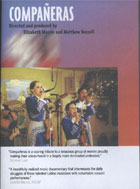
Compañeras 2009
Distributed by Filmakers Library, 124 East 40th Street, New York, NY 10016; 202-808-4980
Produced by Elizabeth Massie and Matthew Buzzell
Directed by Elizabeth Massie and Matthew Buzzell
DVD, color, 59 min.
Jr. High - Adult
Latin American Studies, Music, Women's Studies
Date Entered: 02/22/2010
Reviewed by Kayo Denda, Rutgers UniversityThe documentary Compañeras follows a group of women musicians composing the first all female mariachi group in the United States. Breaking the barrier of this musical expression associated with men, the members of Las Reynas de Los Angeles speak of their passion for mariachi and pride in cultural heritage. They also speak candidly on many issues regarding the struggles women face balancing family demands with a career. It is a nuanced documentary offering rich material for discussion as well as engaging performances.
Since their inception in 1994, Las Reynas have inspired other women grassroots mariachi professional groups, expanding mariachi’s popularity to new audiences. Mariachi, the most nationally prominent Mexican folk musical expression, has been traditionally male dominated, with women being consistently discouraged to participate. Jose Hernandez, founder of the Mariachi Heritage Society and Las Reynas, mentions on camera that his family mariachi group consisted exclusively of male members, and his sisters were never encouraged to play an instrument or to sing. Through the Mariachi Heritage Society, Fernandez has been offering classes in violin, guitar, trumpet, vihuela, and guitarron to preserve this musical heritage. He comments that half of the students are girls, and they enjoy having a role model in Las Reynas. Archetypal mariachi songs are love serenades sung by men, but Las Reynas have incorporated into their repertory songs with lyrics that speak of women’s empowerment, respect for women’s work at home, and their need for caring men as life companions.
The film weaves through portraits of current and former Las Reynas members, who speak to the camera about difficult and conflicting issues. Cindy, a classically trained violinist, expresses enthusiasm for the music and fondly reminisces about her years in the band. Yet, she also speaks about the challenges she faced as the band leader providing musical guidance and performing in a group with wide ranging musical skills and maturity. While the mariachi band was a career for Cindy, the sole white woman of the group, for some members it was a peer group that provided support and companionship in many aspects of their personal lives, including motherhood. For others, it was a part-time job while attending school, or a complement for part-time work until a more favorable or permanent occupation arose. These differences often created tension among band members that most likely influenced the quality of performances.
The reality, as expressed by Jose Hernandez, is the impossibility to make a living solely with Las Reynas, performances. The group has a limited number of regular engagements and is paid less than more popular male mariachi bands. This situation mirrors the reality of women in almost all professions where lower salary and the myth of male superiority unfortunately still exist. Both the image and sound quality of the documentary are excellent, with historical footages of mariachi bands, as well as current and old photos of band members, juxtaposed with performances and other scenes. All the songs by Las Reynas are subtitled, giving the non-Spanish speakers an opportunity to fully understand the lyrics and enjoy the performances.